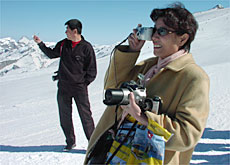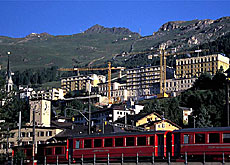St Moritz proud of made-in-China label

The exclusive mountain resort of St Moritz has unveiled details of its licensing agreement with a luxury property development in the Chinese city of Shenzhen.
“St Moritz Gardens” will not only be one of the most expensive places to live in the booming city of 10 million people, but a unique and free advertisement for the Swiss resort.
The new residential area in Shenzhen’s so-called Honey Lake District will house more than 5,000 people when it is completed in two years’ time.
Surrounded by forested hills, the development will include a clubhouse, two pools, a health centre and spa, a cinema and its own ballet school and conservatory of music. And the 300 square metre “Switzerland Hall” will serve to whet wealthy residents’ appetite for the original.
The partnership began in 2004 when the property developers were looking for a name for the new residential area. They came into contact with the Swiss tourist board’s office in Hong Kong, who sold them on St Moritz.
“Most Chinese have never heard of St Moritz, and those that travel to Switzerland go to Zurich, Geneva, Interlaken or Montreux,” Casey Liu, Switzerland Tourism’s chief representative for Hong Kong and South China told swissinfo.
But she said businessmen were looking for a more exclusive name than, for example, Interlaken. After reciprocal visits by a Chinese delegation to St Moritz, and St Moritz officials to Shenzhen, a deal was signed allowing the new development to use the trademark.
The Swiss tourist industry has been investing heavily in promotional campaigns in China, and the future of St Moritz – with its reliance on overseas visitors –depends largely on how successful it can tap into new markets.
Swiss tourists account for only 30 per cent of hotel stays in St Moritz, compared with over 50 per cent for Switzerland’s tourist industry as a whole.
Jet set
St Moritz has lived off its reputation as the winter resort of choice for the international jet set, but it has received a lot of bad press at home, mainly due to an unchecked construction boom of holiday flats and chalets that critics say mar the landscape.
Ironically, it is the demand for luxury residences in China that could secure St Moritz’s future.
Tourist director, Hans Peter Danuser, who spearheaded the move 20 years ago to register the resort’s name, is convinced St Moritz Gardens will help generate up to 20,000 hotel stays by Chinese tourists in a few years’ time.
“This is the most expensive, most exclusive and extravagant development in the area,” Danuser told swissinfo. “The region has a sub-tropical climate, so it can be quite hot there. I can well imagine residents dreaming of seeing Swiss glaciers and booking a trip on the Glacier Express train [which stops in St Moritz].”
Danuser says a trademark name only makes financial sense if it can be promoted. Lacking the budget to do so, the resort has sold licence fees over the years to a range of companies, allowing them to put St Moritz and its sun logo on a variety of products, from watches to champagne.
St Moritz Gardens received the rights for free, but the contract, according to Danuser, stipulates that the property developers must meet certain quality standards.
Motorway signs showing the way to “St Moritz” will also make the name known to a much wider public in Guangdong province. And if and when the Chinese start flocking to St Moritz, they will be greeted in their own language.
“Our most important brochures are already printed in Mandarin,” Danuser explains. “And the signposts for some of our tours are written in English and Japanese – and Mandarin.”
swissinfo, Dale Bechtel
Switzerland received “Approved Destination Status” (ADS) from the Chinese government on September 1, 2004.
This does away with most bureaucratic hurdles for Chinese wishing to travel to an ADS country.
The number of Chinese tourists visiting Switzerland has increased rapidly since then. There was a 17.6% rise in the first nine months of 2006 well above the 6.2% average growth for tourists coming from overseas.
Switzerland Tourism predicts that the number of nights Chinese spend in Swiss hotels will increase from an estimated 180,000 this year to 300,000 next, putting them second only to the Japanese among Asian travellers.

In compliance with the JTI standards
More: SWI swissinfo.ch certified by the Journalism Trust Initiative













You can find an overview of ongoing debates with our journalists here . Please join us!
If you want to start a conversation about a topic raised in this article or want to report factual errors, email us at english@swissinfo.ch.